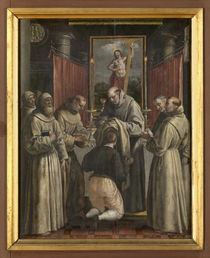The Catholic Defender: Saint Joachima "Joaquina of Saint Francis of Assisi"
- Donald Hartley

- Jun 9
- 3 min read
Updated: Jun 11
Deepertruth with special permission and aid with Franiciscan Media, a great team for the Lord

Joaquima Vedruna Vidal de Mas was born on 16 April 1783 in Barcelona to the nobles Lorenzo de Vedruna - who worked for the government.
Born into an aristocratic family in Barcelona, Spain, Joachima was 12 when she expressed a desire to become a Carmelite nun. But her life took an altogether different turn at 16 with her marriage to a young lawyer, Theodore de Mas. Both deeply devout, they became secular Franciscans. During their 17 years of married life they raised eight children.
Her childhood was a pious one and she fostered a special devotion to the Infant Jesus while being known for her obsessive cleanliness and she made her First Communion in 1792
When Napoleon invaded Spain, Theodore served in the Spanish army, after he had moved his family to Vich. When the French troops arrived there, Joachima had to flee with her children; but after the war she returned to that city, the birthplace of her husband.
Joachima and Theodore were both members of the Third Order fraternity at the Capuchin church in Vich. She was only thirty-three when Theodore died in 1816 at the age of forty-two.
Though her old desire to enter a religious community was still strong in her, Saint Joachima de Vedruna had duties to perform towards her children; and so, for the first seven years of her widowhood she took care of her children.
At the same time, she led an austere life, wearing the Tertiary habit as her ordinary dress, spending much time in prayers, and waiting on the sick in the hospital at Vich.
One day in 1820, as Saint Joachima de Vedruna was passing the Capuchin church, her mount refused to go farther. She went into the church and entered the confessional of Father Stephen of Olot, a noted preacher and director of souls. He told her that she was not to join an existing religious order but to found a new community which would devote itself to teaching in schools and to nursing the sick.
The normalcy of their family life was interrupted when Napoleon invaded Spain. Joachima had to flee with the children; Theodore remained behind and died. Though Joachima re-experienced a desire to enter a religious community, she attended to her duties as a mother. At the same time, the young widow led a life of austerity and chose to wear the habit of the Third Order of St. Francis as her ordinary dress. She spent much time in prayer and visiting the sick.
Four years later, with some of her children now married and younger ones under their care, Joachima confessed her desire to a priest to join a religious order. With his encouragement, she established the Carmelite Sisters of Charity. In the midst of the fratricidal wars occurring at the time, Joachima was briefly imprisoned and later exiled to France for several years.
she died during a cholera epidemic in Barcelona on 28 August 1854 but she fell victim to paralysis since 1850. Her first attack of apoplexy came in September 1849 with more following. Her remains are in the order's motherhouse in Vic. Her order now operates in nations such as Japan and Eritrea while in 2008 there were 2012 religious in 280 houses.
Sickness ultimately compelled her to resign as superior of her order. Over the next four years she slowly succumbed to paralysis, which caused her to die by inches. At her death in 1854 at the age of 71, Joachima was known and admired for her high degree of prayer, deep trust in God, and selfless charity. Joachima was beatified by Pope Pius XII in 1940, and canonized by Pope John XXIII in 1959. Her liturgical feast is celebrated on August 28.
The sainthood cause commenced under Pope Benedict XV on 14 January 1920 in a move that titled her as a Servant of God while the confirmation of her model life of heroic virtue allowed for Pope Pius XI to title her as Venerable on 16 June 1935. The confirmation of two miracles attributed to her intercession saw Pope Pius XII preside over her beatification on 19 May 1940 and the confirmation of another two allowed for Pope John XXIII to canonize her on 12 April 1959 in Saint Peter's Basilica.
Joachima understands loss. She lost the home where her children grew up, her husband, and finally her health. As the power to move and care for her own needs slowly ebbed away, this woman who had all her life cared for others became wholly dependent; she required help with life’s simplest tasks. When our own lives go spinning out of control, when illness and bereavement and financial hardship strike, all we can do is cling to the belief that sustained Joachima: God watches over us always.





















Comments